Zara vs. H&M: Analyzing Marketing Strategies and Effectiveness
VerifiedAdded on 2023/04/23
|14
|1166
|59
Presentation
AI Summary
This presentation analyzes the marketing strategies of Zara and H&M, aiming to assess the effectiveness of Zara's approach. The study employs a mixed-methods approach, incorporating both primary and secondary data collection. Primary data is gathered through questionnaires distributed to customers, while secondary data validates the study's quality. The research design includes a detailed schedule outlining data collection, analysis, and expected outcomes. The presentation describes the target population, sampling techniques, and limitations such as time constraints and potential sampling errors. It also includes interview questions to gauge consumer preferences and behaviors. The expected outcome is an evaluation of Zara's position in the fashion market, offering insights into its marketing effectiveness and consumer perceptions.
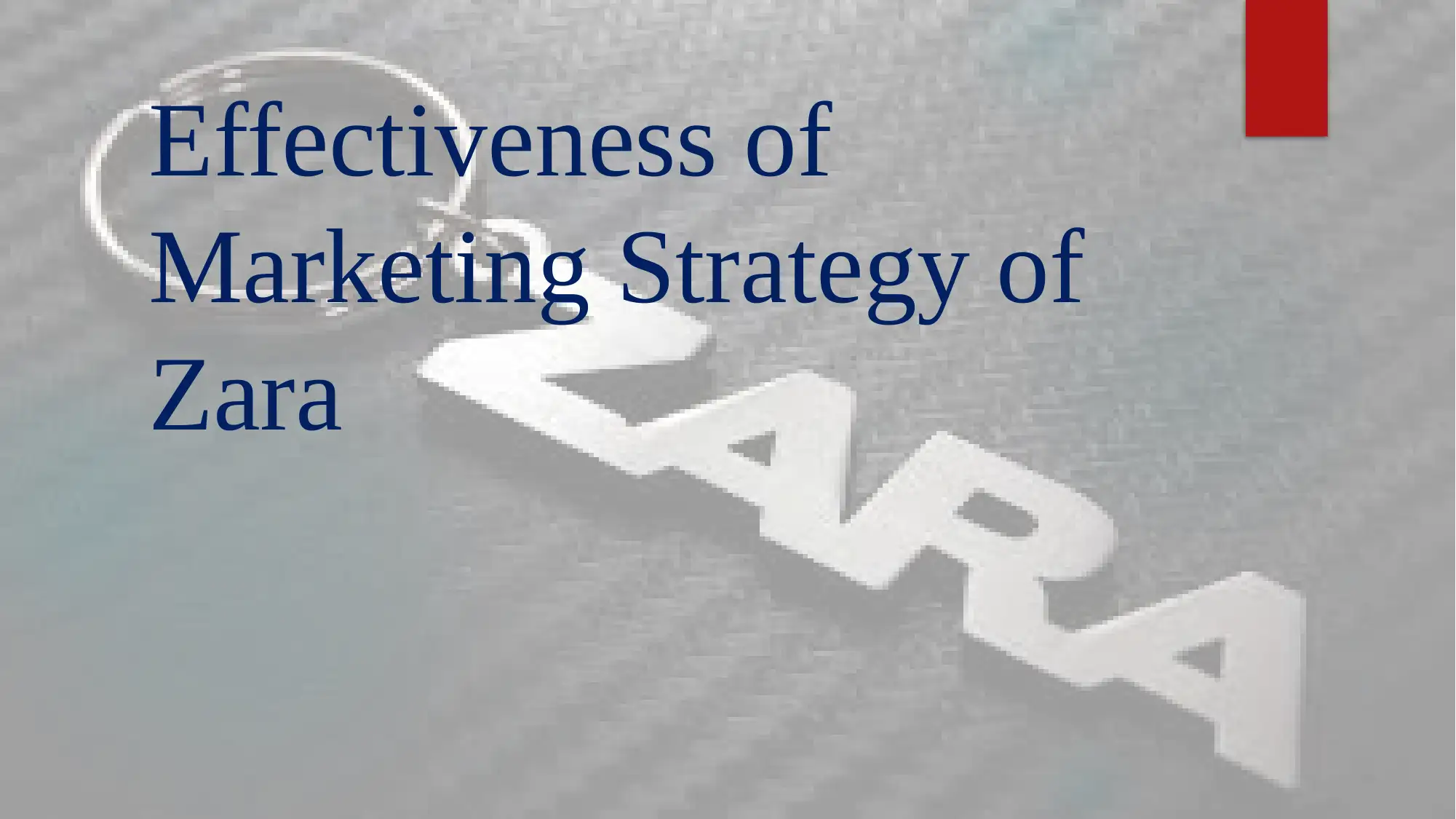
Effectiveness of
Marketing Strategy of
Zara
Marketing Strategy of
Zara
Paraphrase This Document
Need a fresh take? Get an instant paraphrase of this document with our AI Paraphraser
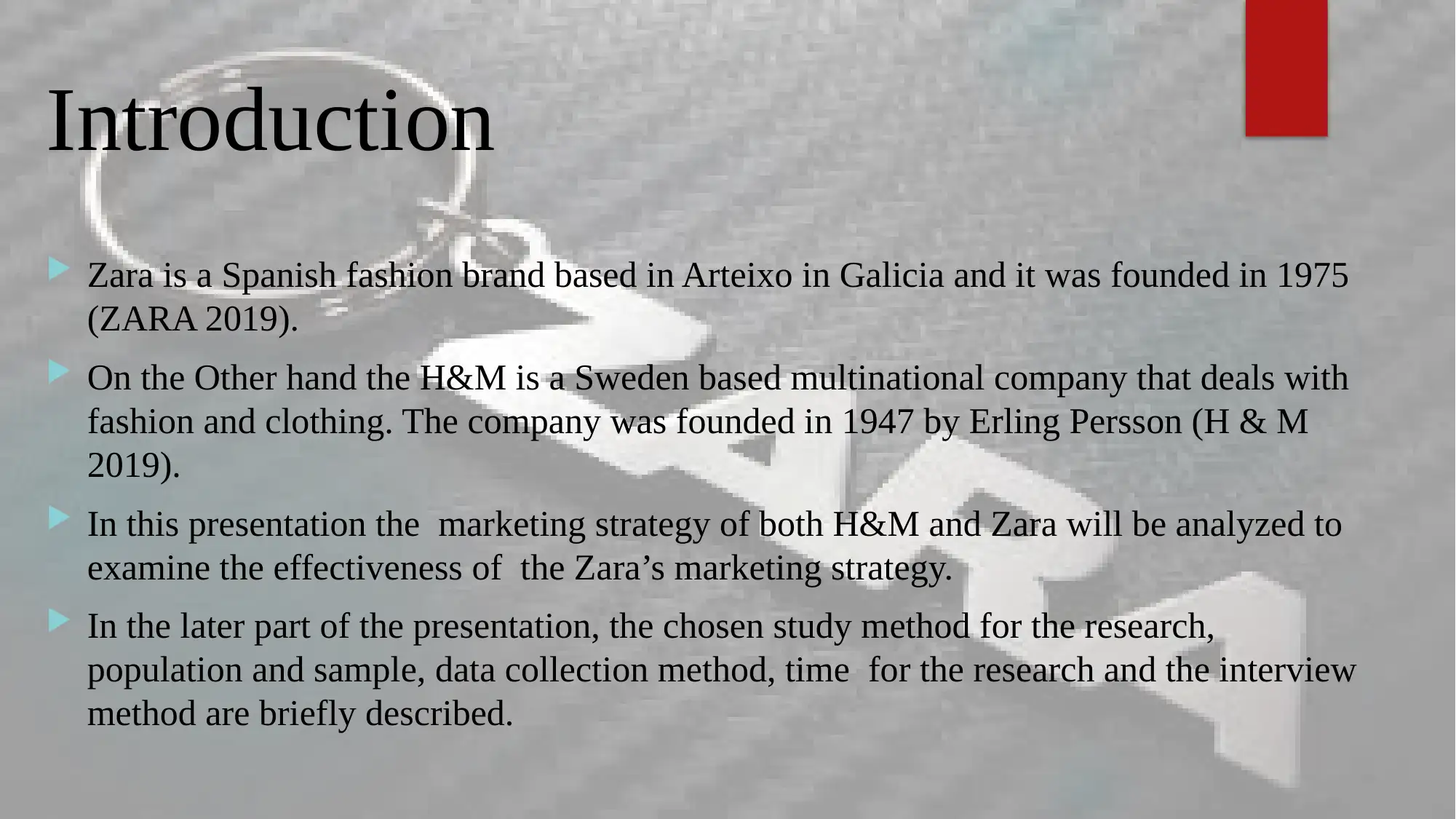
Introduction
Zara is a Spanish fashion brand based in Arteixo in Galicia and it was founded in 1975
(ZARA 2019).
On the Other hand the H&M is a Sweden based multinational company that deals with
fashion and clothing. The company was founded in 1947 by Erling Persson (H & M
2019).
In this presentation the marketing strategy of both H&M and Zara will be analyzed to
examine the effectiveness of the Zara’s marketing strategy.
In the later part of the presentation, the chosen study method for the research,
population and sample, data collection method, time for the research and the interview
method are briefly described.
Zara is a Spanish fashion brand based in Arteixo in Galicia and it was founded in 1975
(ZARA 2019).
On the Other hand the H&M is a Sweden based multinational company that deals with
fashion and clothing. The company was founded in 1947 by Erling Persson (H & M
2019).
In this presentation the marketing strategy of both H&M and Zara will be analyzed to
examine the effectiveness of the Zara’s marketing strategy.
In the later part of the presentation, the chosen study method for the research,
population and sample, data collection method, time for the research and the interview
method are briefly described.
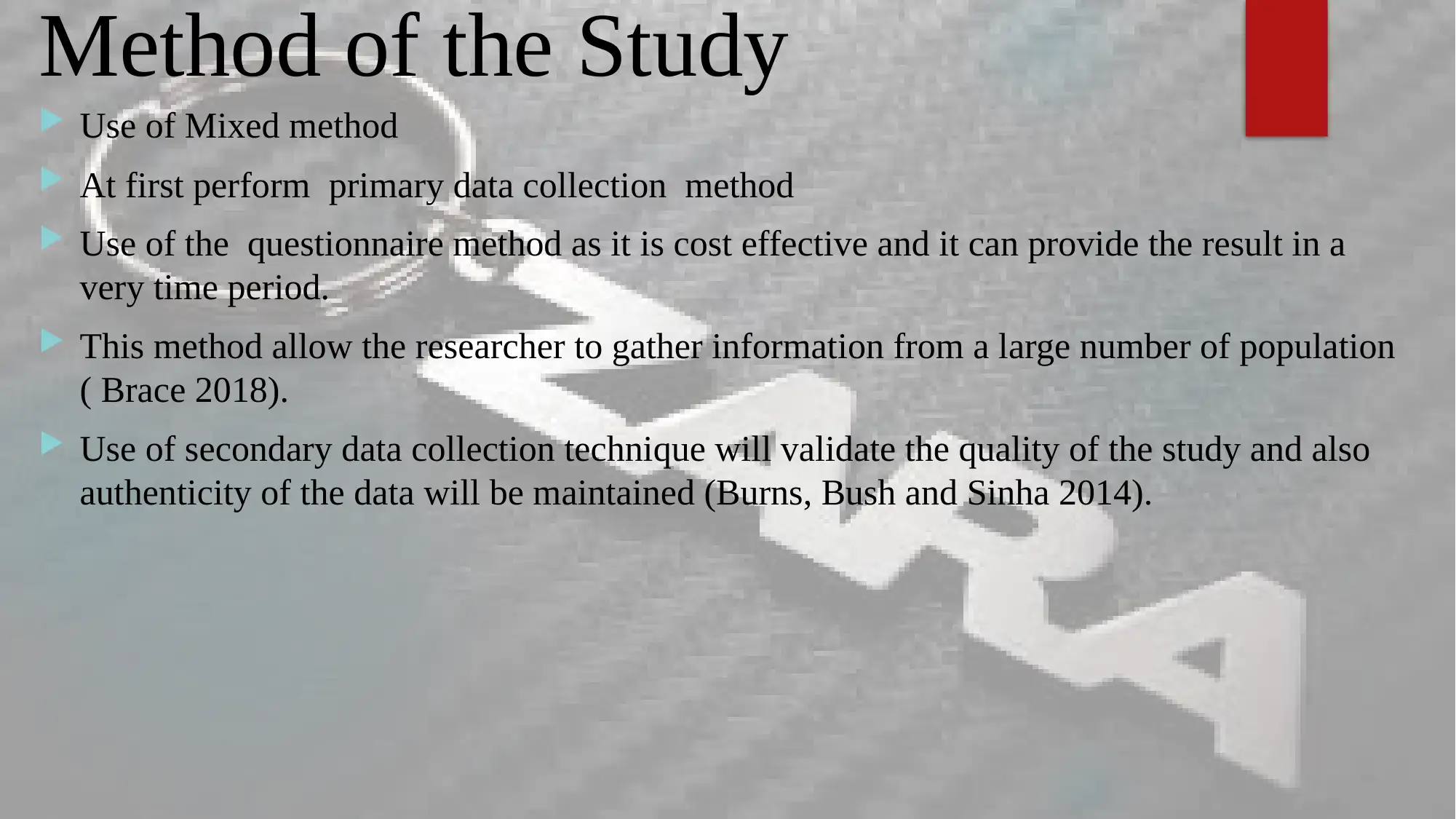
Method of the Study
Use of Mixed method
At first perform primary data collection method
Use of the questionnaire method as it is cost effective and it can provide the result in a
very time period.
This method allow the researcher to gather information from a large number of population
( Brace 2018).
Use of secondary data collection technique will validate the quality of the study and also
authenticity of the data will be maintained (Burns, Bush and Sinha 2014).
Use of Mixed method
At first perform primary data collection method
Use of the questionnaire method as it is cost effective and it can provide the result in a
very time period.
This method allow the researcher to gather information from a large number of population
( Brace 2018).
Use of secondary data collection technique will validate the quality of the study and also
authenticity of the data will be maintained (Burns, Bush and Sinha 2014).
⊘ This is a preview!⊘
Do you want full access?
Subscribe today to unlock all pages.

Trusted by 1+ million students worldwide
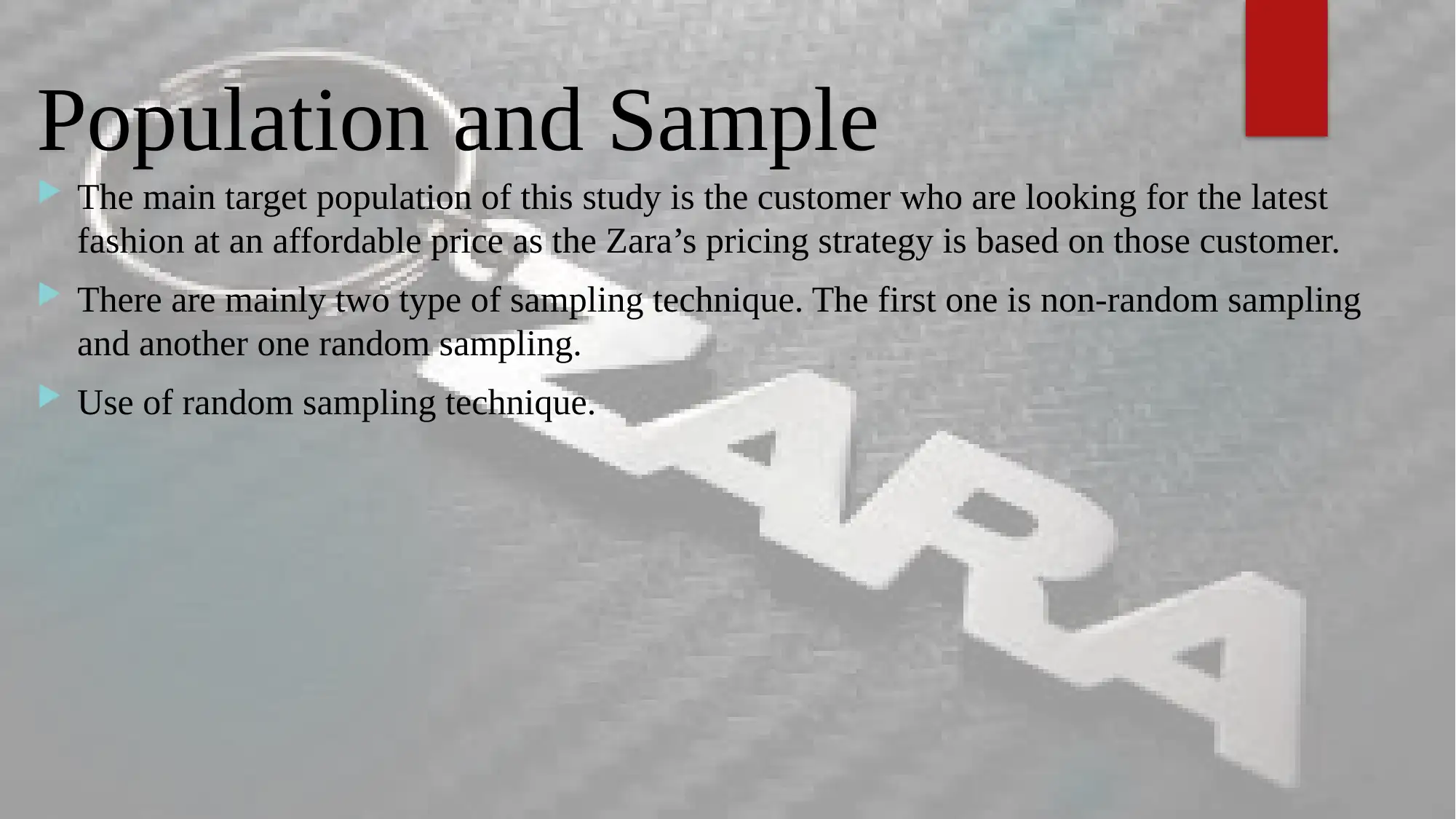
Population and Sample
The main target population of this study is the customer who are looking for the latest
fashion at an affordable price as the Zara’s pricing strategy is based on those customer.
There are mainly two type of sampling technique. The first one is non-random sampling
and another one random sampling.
Use of random sampling technique.
The main target population of this study is the customer who are looking for the latest
fashion at an affordable price as the Zara’s pricing strategy is based on those customer.
There are mainly two type of sampling technique. The first one is non-random sampling
and another one random sampling.
Use of random sampling technique.
Paraphrase This Document
Need a fresh take? Get an instant paraphrase of this document with our AI Paraphraser

Data collection
Use of the quantitative data collection method.
The second part is secondary data collection method by using questionnaire.
Use of the quantitative data collection method.
The second part is secondary data collection method by using questionnaire.

Schedule Design
In the first week of the research, collect the primary data by using the questionnaire
developed by the researcher.
Use random sampling technique
After , collecting the primary data, initiate the process of secondary data collection.
Analysis of the data.
In the first week of the research, collect the primary data by using the questionnaire
developed by the researcher.
Use random sampling technique
After , collecting the primary data, initiate the process of secondary data collection.
Analysis of the data.
⊘ This is a preview!⊘
Do you want full access?
Subscribe today to unlock all pages.

Trusted by 1+ million students worldwide
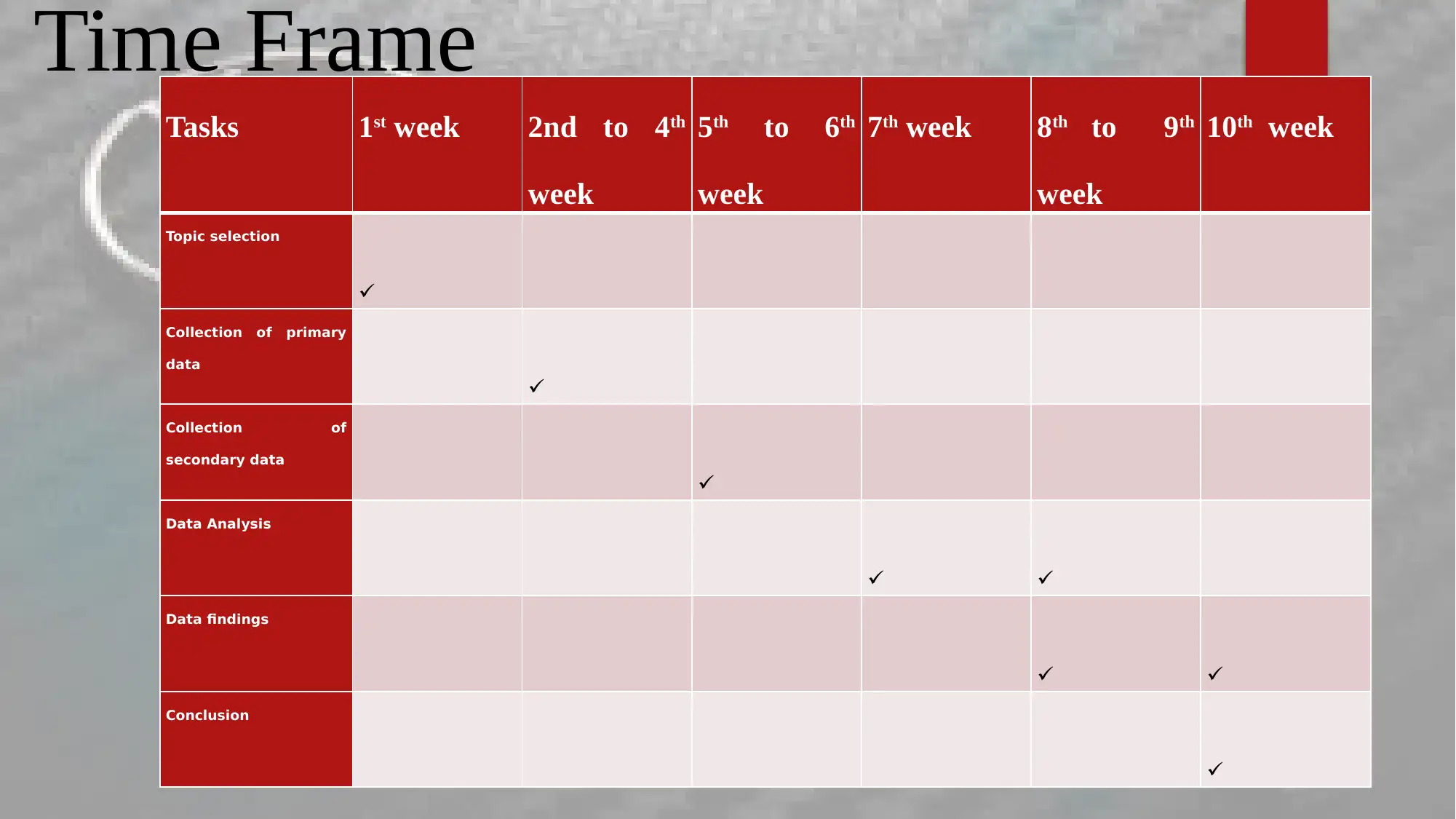
Time Frame
Tasks 1st week 2nd to 4th
week
5th to 6th
week
7th week 8th to 9th
week
10th week
Topic selection
Collection of primary
data
Collection of
secondary data
Data Analysis
Data findings
Conclusion
Tasks 1st week 2nd to 4th
week
5th to 6th
week
7th week 8th to 9th
week
10th week
Topic selection
Collection of primary
data
Collection of
secondary data
Data Analysis
Data findings
Conclusion
Paraphrase This Document
Need a fresh take? Get an instant paraphrase of this document with our AI Paraphraser
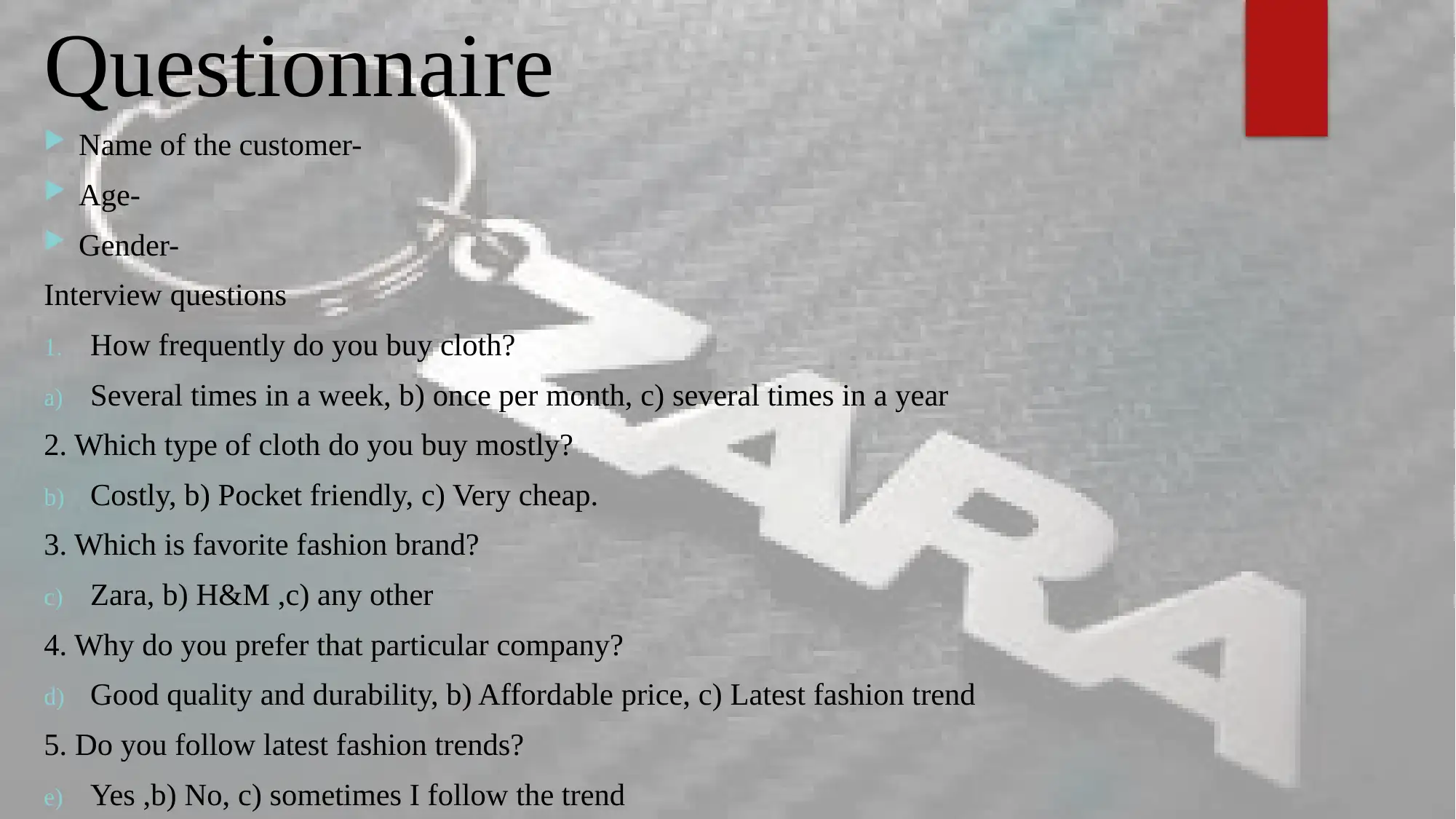
Questionnaire
Name of the customer-
Age-
Gender-
Interview questions
1. How frequently do you buy cloth?
a) Several times in a week, b) once per month, c) several times in a year
2. Which type of cloth do you buy mostly?
b) Costly, b) Pocket friendly, c) Very cheap.
3. Which is favorite fashion brand?
c) Zara, b) H&M ,c) any other
4. Why do you prefer that particular company?
d) Good quality and durability, b) Affordable price, c) Latest fashion trend
5. Do you follow latest fashion trends?
e) Yes ,b) No, c) sometimes I follow the trend
Name of the customer-
Age-
Gender-
Interview questions
1. How frequently do you buy cloth?
a) Several times in a week, b) once per month, c) several times in a year
2. Which type of cloth do you buy mostly?
b) Costly, b) Pocket friendly, c) Very cheap.
3. Which is favorite fashion brand?
c) Zara, b) H&M ,c) any other
4. Why do you prefer that particular company?
d) Good quality and durability, b) Affordable price, c) Latest fashion trend
5. Do you follow latest fashion trends?
e) Yes ,b) No, c) sometimes I follow the trend
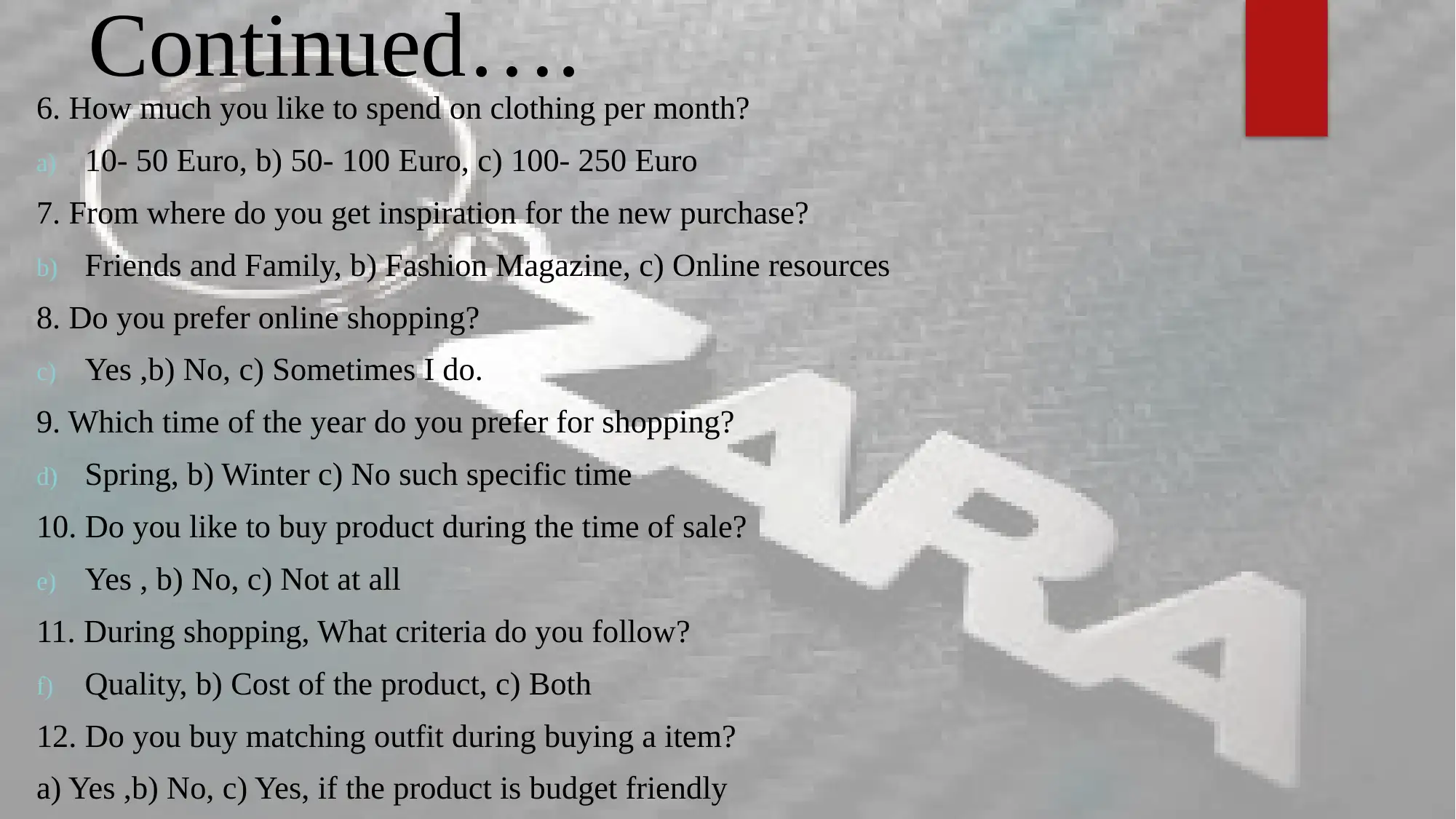
Continued….6. How much you like to spend on clothing per month?
a) 10- 50 Euro, b) 50- 100 Euro, c) 100- 250 Euro
7. From where do you get inspiration for the new purchase?
b) Friends and Family, b) Fashion Magazine, c) Online resources
8. Do you prefer online shopping?
c) Yes ,b) No, c) Sometimes I do.
9. Which time of the year do you prefer for shopping?
d) Spring, b) Winter c) No such specific time
10. Do you like to buy product during the time of sale?
e) Yes , b) No, c) Not at all
11. During shopping, What criteria do you follow?
f) Quality, b) Cost of the product, c) Both
12. Do you buy matching outfit during buying a item?
a) Yes ,b) No, c) Yes, if the product is budget friendly
a) 10- 50 Euro, b) 50- 100 Euro, c) 100- 250 Euro
7. From where do you get inspiration for the new purchase?
b) Friends and Family, b) Fashion Magazine, c) Online resources
8. Do you prefer online shopping?
c) Yes ,b) No, c) Sometimes I do.
9. Which time of the year do you prefer for shopping?
d) Spring, b) Winter c) No such specific time
10. Do you like to buy product during the time of sale?
e) Yes , b) No, c) Not at all
11. During shopping, What criteria do you follow?
f) Quality, b) Cost of the product, c) Both
12. Do you buy matching outfit during buying a item?
a) Yes ,b) No, c) Yes, if the product is budget friendly
⊘ This is a preview!⊘
Do you want full access?
Subscribe today to unlock all pages.

Trusted by 1+ million students worldwide
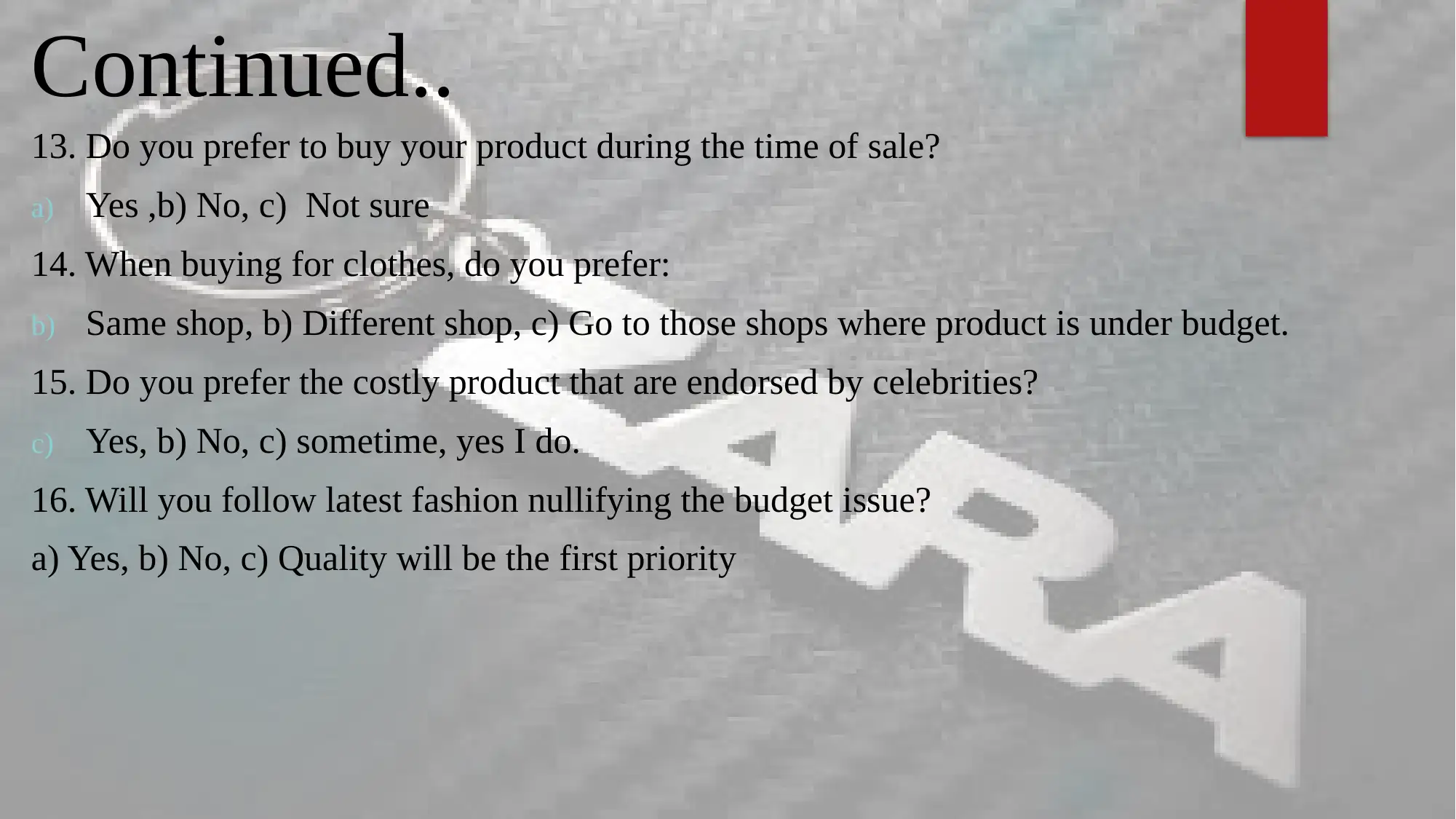
Continued..
13. Do you prefer to buy your product during the time of sale?
a) Yes ,b) No, c) Not sure
14. When buying for clothes, do you prefer:
b) Same shop, b) Different shop, c) Go to those shops where product is under budget.
15. Do you prefer the costly product that are endorsed by celebrities?
c) Yes, b) No, c) sometime, yes I do.
16. Will you follow latest fashion nullifying the budget issue?
a) Yes, b) No, c) Quality will be the first priority
13. Do you prefer to buy your product during the time of sale?
a) Yes ,b) No, c) Not sure
14. When buying for clothes, do you prefer:
b) Same shop, b) Different shop, c) Go to those shops where product is under budget.
15. Do you prefer the costly product that are endorsed by celebrities?
c) Yes, b) No, c) sometime, yes I do.
16. Will you follow latest fashion nullifying the budget issue?
a) Yes, b) No, c) Quality will be the first priority
Paraphrase This Document
Need a fresh take? Get an instant paraphrase of this document with our AI Paraphraser
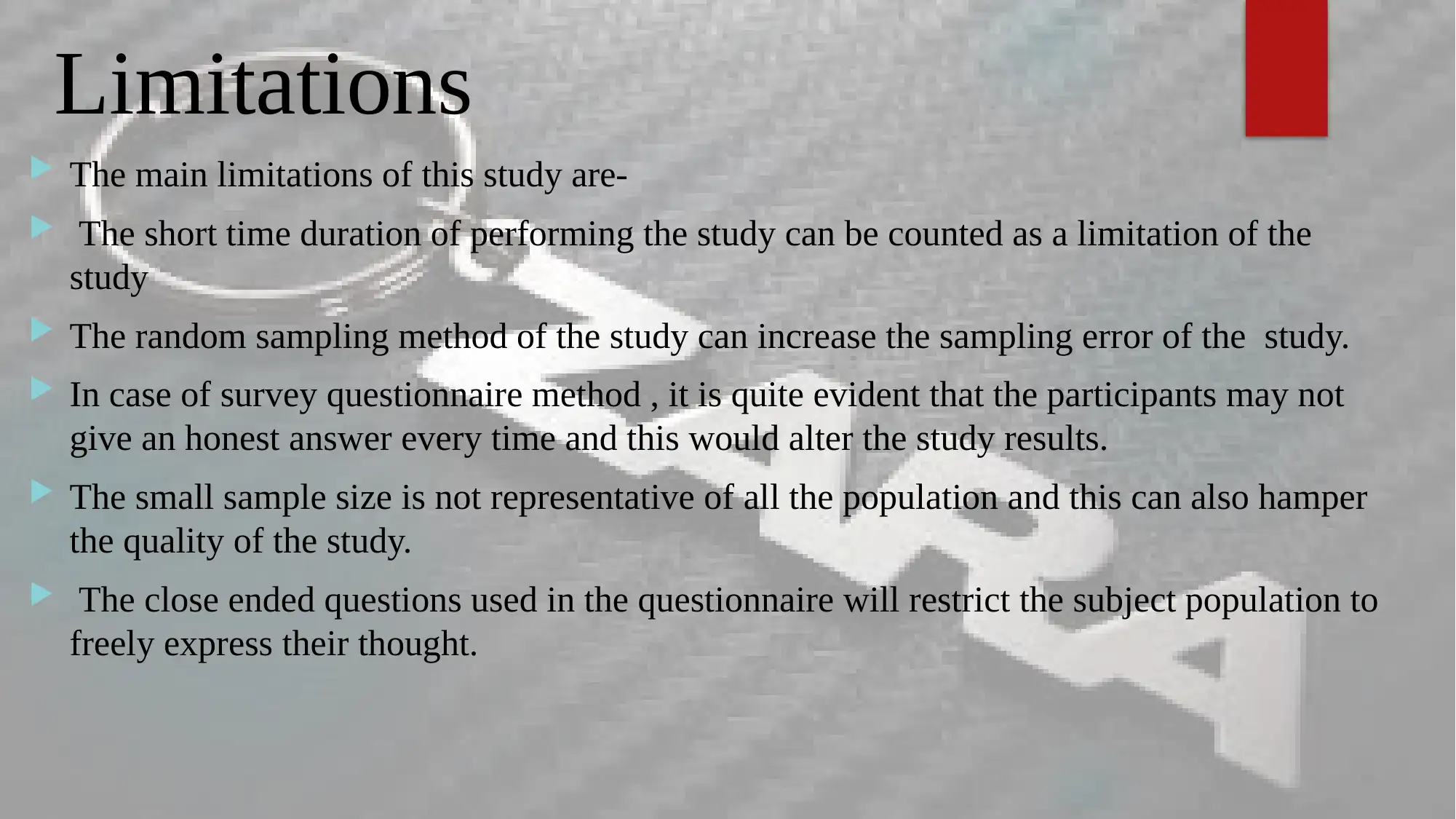
Limitations
The main limitations of this study are-
The short time duration of performing the study can be counted as a limitation of the
study
The random sampling method of the study can increase the sampling error of the study.
In case of survey questionnaire method , it is quite evident that the participants may not
give an honest answer every time and this would alter the study results.
The small sample size is not representative of all the population and this can also hamper
the quality of the study.
The close ended questions used in the questionnaire will restrict the subject population to
freely express their thought.
The main limitations of this study are-
The short time duration of performing the study can be counted as a limitation of the
study
The random sampling method of the study can increase the sampling error of the study.
In case of survey questionnaire method , it is quite evident that the participants may not
give an honest answer every time and this would alter the study results.
The small sample size is not representative of all the population and this can also hamper
the quality of the study.
The close ended questions used in the questionnaire will restrict the subject population to
freely express their thought.
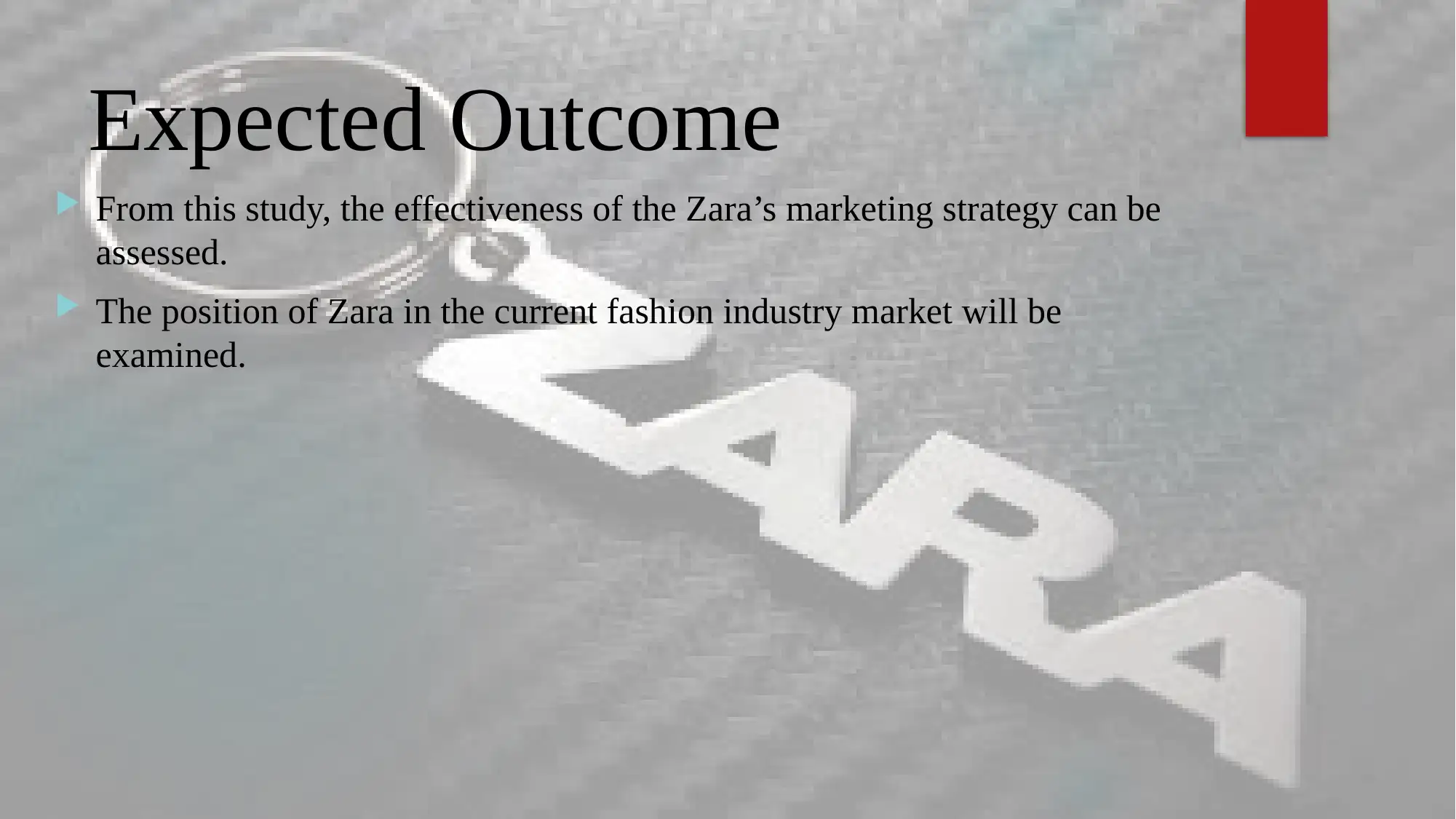
Expected Outcome
From this study, the effectiveness of the Zara’s marketing strategy can be
assessed.
The position of Zara in the current fashion industry market will be
examined.
From this study, the effectiveness of the Zara’s marketing strategy can be
assessed.
The position of Zara in the current fashion industry market will be
examined.
⊘ This is a preview!⊘
Do you want full access?
Subscribe today to unlock all pages.

Trusted by 1+ million students worldwide
1 out of 14
Related Documents
Your All-in-One AI-Powered Toolkit for Academic Success.
+13062052269
info@desklib.com
Available 24*7 on WhatsApp / Email
![[object Object]](/_next/static/media/star-bottom.7253800d.svg)
Unlock your academic potential
Copyright © 2020–2026 A2Z Services. All Rights Reserved. Developed and managed by ZUCOL.





